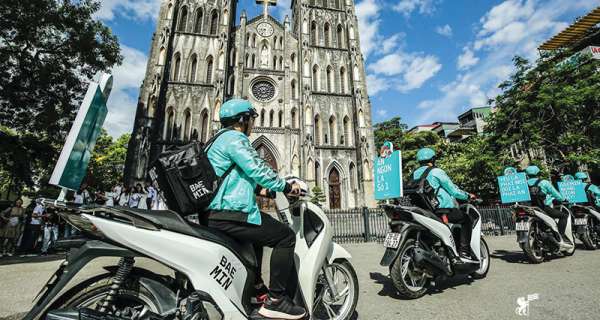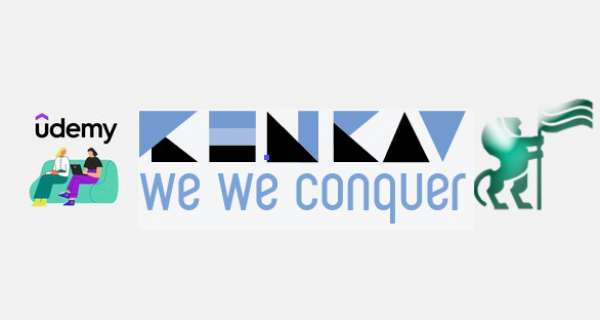Number of AI Unicorns Nearly Doubles but AI Isn't Everything
Vietnamese people are very familiar with South Korean brands like SamSung, LG, Hyundai, or Lotte... but perhaps few know that Tous les Jours and Paris Baguette - bakery chains with very French names - also come from the land of kimchi.
The Journey to Vietnam
Founded in 1997, Tous les Jours opened its first store in Ho Chi Minh City in 2007. Paris Baguette , established earlier in 1988, launched its first store in Ho Chi Minh City in 2011. Between 2007-2011, there were few bakery chains or franchises in Vietnam.
This period coincided with the South Korean government restricting licences for large domestic bakery companies due to market saturation and to protect smaller bakeries. The government's decision to "push boats into the big sea" ultimately created a combined "empire" of over 5,700 bakeries for both Tous les Jours and Paris Baguette in South Korea and abroad.
In Vietnam, as of now, Tous les Jours has 40 stores in Ho Chi Minh City, Hanoi, and Hai Phong, while Paris Baguette has 10 stores in Ho Chi Minh City and Hanoi, according to data compiled by Saigon Economics from the official fanpages and websites of these chains.
Similar to Tous les Jours and Paris Baguette, the South Korean startup community also looked to Vietnam as a new horizon.
Based on LinkedIn data, a 2023 survey by Singapore-based private equity fund Asia Partners revealed that 250 South Korean founders, co-founders, and CEOs have opened offices or branches in Southeast Asia. Among these, Vietnam was the second most popular choice at 21%, behind Singapore at 38% and ahead of Indonesia at 20%, far surpassing countries like Thailand (7%), Malaysia (6%), and Cambodia (1%).
In August 2023, the South Korean Ministry of SMEs and Startups launched the "Startup Korea" program, aiming to raise 10 trillion won ($7.25 billion at current rates) in 2024 to fund domestic activities and global business expansion of South Korean startups.
In November 2023, the K-Startup Center was established in a Lotte building in Ba Dinh District, Hanoi - becoming the fourth such center after Seattle in the US, Paris in France, and Singapore.
A similar center was also launched at Diamond Plaza in District 1, Ho Chi Minh City. Here, South Korean startups receive partial, substantial, or free support for rent, market information, and business opportunities. Once they grow large enough, startups can choose to move out but still receive support from these centers - according to Ms. Pham Thi Huong Thao, CEO of F1Security, a South Korean cybersecurity company operating at Diamond Plaza.
"South Korean startups choose Vietnam as one of their first destinations in their global market expansion campaign due to South Korea's 'Southern Policy.' Not only do they receive benefits in the domestic market, but startups and venture capital funds also receive government support for overseas operations," said Mr. Huynh Cong Thang, founder and CEO of Innolab Asia, a Vietnamese company based in Ho Chi Minh City specializing in startup consulting.
This CEO told Saigon Economics that last November, Innolab Asia organized a nearly six-week trip for South Korean startups and investment funds to meet and explore opportunities and investment models with Vietnamese partners. The entire cost of the trip was sponsored by the South Korean government.
Many Unicorns Fail
In its 2023 audit report, Woowa Brothers - the parent company of Baemin Vietnam - said they had suffered consecutive years of losses after failing to compete and expand market share in Vietnam despite "planting their flag" in about 10 provinces and cities in Vietnam since 2019.
Baemin succumbed to two major competitors, Grab and ShopeeFood, with market shares of 45% and 41% respectively, while being chased by similar-sized rivals like Be and Gojek. Earlier, Woowa's online retail arm, WBV Retail, had to close earlier in 2020, just a year after its launch.
Similarly, Viva Republica, the operator of South Korean financial super app Toss, also closed Toss Southeast Asia, headquartered in Singapore, at the end of 2023, just a year after its launch. Toss failed to grow in Southeast Asia for various reasons.
The startup ecosystem in South Korea and Vietnam has faced challenges recently. The global economic slowdown, rising interest rates, and geopolitical tensions have made investors more cautious. This has led to a "funding winter" where startups find it harder to raise capital.
In South Korea, the number of new unicorns has slowed. According to CB Insights, South Korea had 18 unicorns as of April 2023, ranking 7th globally. However, this number hasn't grown significantly since then. Some unicorns have even seen their valuations drop below the $1 billion mark.
Vietnam's startup scene has also felt the impact. While the country saw its first unicorn, VNG, in 2014, and a few more like VNPay and Sky Mavis in recent years, the pace of unicorn creation has been slower than hoped. Many promising startups have struggled to scale and achieve profitability.
The failures of Baemin and Toss in Vietnam highlight the challenges of entering new markets. Despite their success in South Korea, these companies struggled to adapt to the unique characteristics of the Vietnamese market. They faced intense competition from established players and couldn't differentiate themselves sufficiently.
These setbacks have led to a more cautious approach among both South Korean and Vietnamese startups. Instead of rapid expansion, many are now focusing on sustainable growth and achieving profitability. There's a greater emphasis on understanding local market dynamics and building strong foundations before scaling.
However, it's not all doom and gloom. The challenges have also led to more collaboration between South Korean and Vietnamese startups. Many are partnering to leverage each other's strengths and navigate the market more effectively.
The South Korean government's continued support for startups expanding globally, especially in Southeast Asia, shows a long-term commitment to fostering innovation and international growth. Programs like "Startup Korea" and the establishment of K-Startup Centers in Vietnam demonstrate this ongoing support.
For Vietnamese startups, the presence of South Korean companies and investors brings opportunities for knowledge transfer, access to capital, and potential partnerships. Many are learning from both the successes and failures of their South Korean counterparts.
Looking ahead, both ecosystems are likely to evolve. There may be a shift towards more specialized, niche startups rather than trying to create "do-it-all" platforms. Sectors like fintech, e-commerce, and AI are likely to remain attractive, but with a greater focus on solving specific local problems.
The experience of Baemin and Toss serves as a valuable lesson for other startups looking to expand internationally. It highlights the importance of thorough market research, adaptability, and patience when entering new markets.
As the startup ecosystems in both countries mature, we may see more sustainable growth models emerge. The focus might shift from chasing unicorn status to building resilient, profitable businesses that can weather economic uncertainties.
In conclusion, while the recent failures of some high-profile startups have created challenges, they've also led to valuable lessons and a more mature approach to growth and expansion. The continued collaboration between South Korean and Vietnamese startups, supported by government initiatives, suggests a promising future for both ecosystems, albeit one that may look different from the unicorn-chasing frenzy of recent years.
Toss entered Vietnam earlier, in 2019, offering small loans, prepaid cards, and credit scoring services. However, they couldn't introduce new financial products due to strict government and central bank regulations. By 2022, Toss's operations in Vietnam recorded a deficit of 10.9 billion won ($7.8 million), forcing closure a year later.
2023 was tough for foreign unicorns, as things "came and went easily," even faster than Uber and WeWork's earlier exits from Vietnam and Southeast Asia.
For instance, in May 2023, Indian self-drive car rental unicorn Zoomcar left Vietnam after over a year, burning over $8 million in the first year. In July 2023, Singapore's "Buy Now, Pay Later" unicorn Atome collapsed after just a year in the market.
Startup experts predict budget hotel unicorns targeting mass-market customers like OYO (from India) and RedDoorz (founded in Indonesia, headquartered in Singapore) show bad signs and may withdraw or have already left Vietnam this year. Many worry about Gojek as its market share is being overtaken by rivals like Grab and Be.
Widespread Concern?
Korean and global venture funds invested heavily in Vietnamese startups during 2019-2021. But things changed significantly afterward. David Kim, CEO of The Invention Lab fund, says Korean and other global venture funds are no longer investing actively in Vietnam as before.
"Most Korean investments have lost money. Since late July 2022, they've been quite cautious about investing in local Vietnamese startups," Kim told DealStreetAsia.
Korean experts told KED Global that compared to Vietnamese market competitors, unicorns like Baemin and Toss failed to localize products and services for local consumers. Many Korean startups quickly left Vietnam after failing to find reliable local resources to help solve domestic issues, from legal to regulatory and tax matters. Low income and purchasing power in Vietnam and other Southeast Asian countries make it hard for Korean startups to profit, especially in healthcare, fashion, and gaming.
Huynh Cong Thang of Innolab Asia says Vietnam is seen as an emerging, undefined market. Thus, it's hard to predict Vietnamese customer sentiment. Price is always the main factor in buying products or services, rather than choosing or supporting favorite brands. Moreover, the "easy money" era is over. When there's no more money to "burn" for promotions as funds stop investing and demand a path to profitability, startups or unicorns must change course.
"They're forced to leave the market for survival strategies elsewhere," the startup consultant said.
The startup ecosystem faces challenges in both countries. The global economic slowdown, rising interest rates, and geopolitical tensions have made investors cautious, leading to a "funding winter" where startups struggle to raise capital.
In South Korea, new unicorn growth has slowed. CB Insights reported 18 Korean unicorns as of April 2023, ranking 7th globally. This number hasn't grown much since. Some unicorns have even seen valuations drop below $1 billion.
Vietnam's startup scene also feels the impact. While VNG became its first unicorn in 2014, followed by VNPay and Sky Mavis recently, unicorn creation has been slower than hoped. Many promising startups struggle to scale and achieve profitability.
Baemin and Toss's failures in Vietnam highlight the challenges of entering new markets. Despite Korean success, these companies struggled to adapt to Vietnam's unique market characteristics. They faced intense competition from established players and couldn't differentiate themselves sufficiently.
These setbacks have led to a more cautious approach among both Korean and Vietnamese startups. Instead of rapid expansion, many now focus on sustainable growth and profitability. There's greater emphasis on understanding local market dynamics and building strong foundations before scaling.
However, it's not all negative. The challenges have also led to more collaboration between Korean and Vietnamese startups. Many are partnering to leverage each other's strengths and navigate the market more effectively.
The Korean government's continued support for startups expanding globally, especially in Southeast Asia, shows a long-term commitment to fostering innovation and international growth. Programs like "Startup Korea" and K-Startup Centers in Vietnam demonstrate this ongoing support.
For Vietnamese startups, the presence of Korean companies and investors brings opportunities for knowledge transfer, access to capital, and potential partnerships. Many are learning from both the successes and failures of their Korean counterparts.
Looking ahead, both ecosystems are likely to evolve. There may be a shift towards more specialized, niche startups rather than trying to create "do-it-all" platforms. Sectors like fintech, e-commerce, and AI are likely to remain attractive, but with a greater focus on solving specific local problems.



















0 Comments